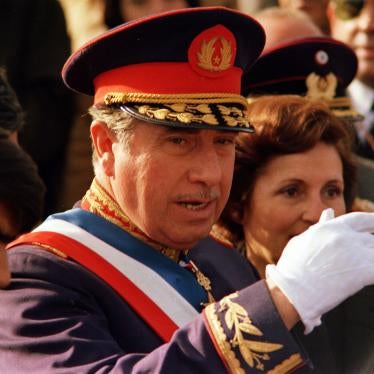The House of Lords has completed two days of hearings about the detention of Augusto Pinochet.
Lawyers for the Crown, representing Spanish authorities who are seeking extradition, presented arguments and answered questions from the five-member panel of judges. The lawyers for Pinochet, who will argue against extradition, have not yet pled their case.
The hearing will resume on Monday, November 9, and is expected to conclude early next week. Human Rights Watch has prepared the following background to help untangle some highly complex legal issues.
What is the legal question before the House of Lords?
According to the certification of appeal from the High Court, which held last week that Pinochet was immune from arrest, the Law Lords must decide "the scope of the immunity enjoyed by a former head of state" for acts committed when he was head of state. The British law supposedly conferring this immunity is the State Immunity Act. That law actually derives from an ancient doctrine dating back to the time of kings, when state authority was fully vested in the sovereign. In those days, the state and the ruler were considered one and the same.
On what basis did the High Court rule that Pinochet had immunity?
The State Immunity Act says that heads of state are not subject to civil or criminal process in the United Kingdom; they can't be sued or prosecuted for any criminal acts. Section 14-1 of the law gives immunity to "the sovereign or other head of state acting in his public capacity."
The law contains two major ambiguities that lie at the core of the case: Does the law apply to former heads of state?
In a highly significant move, the High Court ruled that it does. In most democratic countries, a former head of state would not have immunity from prosecution for the kind of crimes Pinochet committed. What does the term "acting in public capacity" really mean? The High Court suggested that Pinochet's crimes were in fact an exercise of the power that he had by virtue of being head of state. One of the three judges on the Court said that "unfortunately, history has shown that it has indeed been state policy sometimes to suppress particular groups."
Human Rights Watch rejects the notion that any head of state, current or former, can be immune from prosecution for such serious crimes. The notion that torture and murder could be construed as acts in "public capacity" ignores the fact that they are completely illegitimate, and illegal both under international law and under the domestic law of the U.K., Chile, and just about everywhere else.
Should the State Immunity Act be the only law applied in Pinochet's case?
The High Court has interpreted the State Immunity Act very broadly. But the ambiguities in the term "public capacity" should compel the Law Lords to look elsewhere in British law and British legal obligations to determine their ruling. Where domestic law is vague, the Lords should look to international law for guidance.
For example, Britain has legal obligations under the Convention against Torture, to which it is a party, and which contains no ambiguities whatsoever: it requires the government either to prosecute Pinochet or extradite him to a country that will.
Indeed, international law recognizes no exemptions for a head of state. The Nuremberg tribunal established this principle very clearly; its charter reads: "The official position of defendants, whether as heads of state or responsible officials in Government Departments, shall not be considered as freeing them from responsibility or mitigating punishment." These principles have been recognized by the General Assembly of the United Nations as international law. They have been repeated in almost identical terms in the Genocide Convention, in the statutes establishing tribunals for the former Yugoslavia and Rwanda, and in the treaty for the new international criminal court.
What is a crime against humanity?
Isolated acts of torture, murder, and disappearances are not crimes against humanity. The crimes in question must be very serious, and they must be "widespread or systematic," in order to invoke international law. Pinochet's crimes certainly qualify.
Why is British law even relevant to a Spanish extradition request?
Under most extradition treaties, a government can extradite someone only if they could also prosecute them. In other words, the United States would not extradite someone to Belarus for the crime of defaming the president, because that is not a crime in the U.S. Torture is a crime under British law, so Pinochet could certainly be prosecuted in Britain -- if he is judged not to have immunity.
However, if the High Court's judgment is reversed, Pinochet will not immediately be extradited. The current legal proceeding only concerns the arrest warrant issued by Scotland Yard. If Pinochet loses, his lawyers can mount another challenge when Spain finally makes its formal request for extradition.







